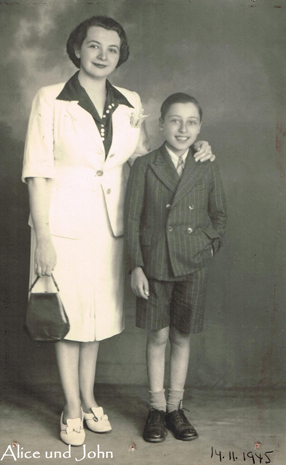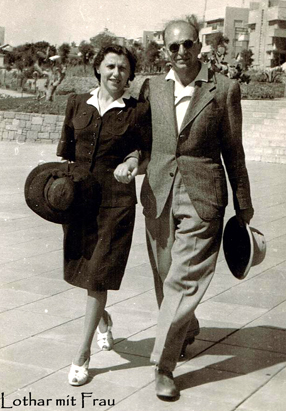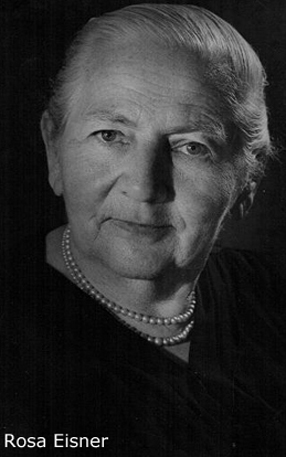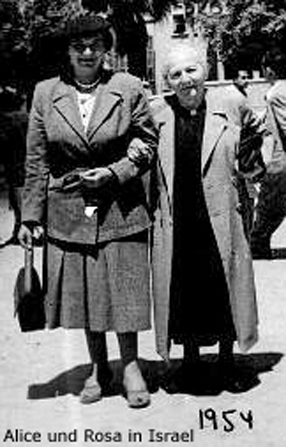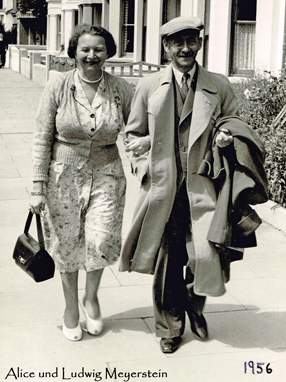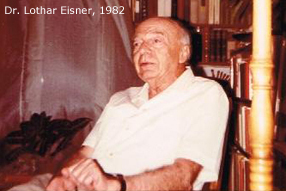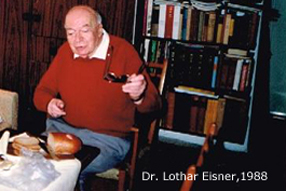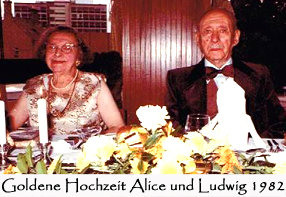 |
 |
 |
 |
 |
 |
 |
 |
Ludwig Eisner wasn't able to work in England, he lived on the support of support organizations. But he kept his style. Each day he dressed with lavish elegance. He lead an affluent social life, and met many people in cafes; very likely also some female acquaintances. After the war Ludwig Eisner traveled from England to Jerusalem to live with his wife. Upon his arrival in Palestine he was shocked about the low development level of Palestine. As “born” salesman he made some money by going from door to door and sold household goods. He died on February 7, 1951.
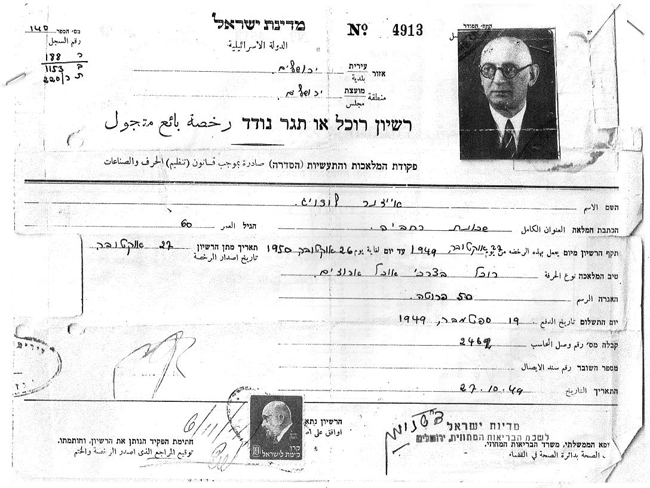
Peddlers-Licence of Ludwig Eisner
Rosa Eisner died in 1962.
In 1942 Dr. Lothar Eisner married Lore Szpigielman. She had made the right assessment of the Nazis already prior to their seizure of power and thus emigrated already 1933. She opened the first flower shop in Jerusalem. However, she lost almost her entirely family, only 10 of 100 family-members survived the Holocaust.
In 1943 their daughter Daniela was born, in 1948 their son Uri Wolf Thomas. To have children in such times was considered insane by their friends. Since many people of that generation didn’t have children, the Eisner children were a kind of surrogate children for many friends and acquaintances of their parents.
Economically the first years after the immigration were difficult. The salary at the British army was very low. The family lived predominantly on the income of his wife. In 1948 the situation became precarious when the riots in the run-up to the foundation of the state Israel became more and more serious. The British army dismissed its civil employees and thus Dr. Eisner became unemployed. And Lore Eisner was not able to earn enough money because it was war in Jerusalem and her shop was closed very often. The situation didn't improve before 1950.
Dr. Eisner needed a new profession. Therefore he started an apprenticeship as a bookseller - with the appropriate low salary. The family still lived on the income of Lore Eisner. After his apprenticeship was finished he worked in different bookshops. Since 1954 Dr. Eisner received a monthly retirement pension from Germany which eased the situation.
At the end of 1959 Dr. Eisner got a 2/3 part-time job at the university library but under the condition that Dr. Eisner graduated as a librarian. And because he didn't speak Hebrew fluently he had to attend a two year course. Without his German retirement pension he couldn't have afforded this training. Upon completion of this training in 1962 he for the first time in his life got a normal salary - he was already 53 years old. It was the salary of a entrant and it didn't increase fast.
Read here the detailed presentation of his occupational career in Israel
given for the restitution authorities in Germany.
Nevertheless Dr. Eisner was happy in his new job. He loved literature, especially German literature. He named his son after Thomas Mann. Obviously he was not too sad that he was not be able to work in his profession as lawyer.
In Israel Dr. Eisner obviously never managed to accommodate himself. Whenever possible he spent his time with German immigrants. For his last 15 years he had been living in a retirement home. The inhabitants of which were exclusively German immigrants, mostly intellectuals. There he loved to talk to the young Germans who were there to fulfill their alternative civil service. Although identifying as a German Dr. Eisner could never ever imagine to return to Germany – not even for a visit.
At the beginning of the 90ties Dr. Eisner gave an interview to the Austrian Professor Anne Betten for the book "Wir sind die Letzten. Fragt uns aus",where he talked about his life. You can hear the whole interview:
Part 1
Part 2
He travelled to Germany only one time, to Freiburg in order to collect his certificates. An invitation to a class-reunion in the 1980ies he couldn’t accept although the invitation was very nicely put and the travel expenses would have been covered. He couldn’t imagine himself sitting around a table with his former schoolmates talking about the good old times and moreover stand up to remember the dead class mates. He would have considered it as betrayal of the murdered Jews, e.g. the couple Spier where he lived during his schooldays in Oppeln or the couple Schüller who were close friends in Gleiwitz and were deported to Auschwitz on 02/17/1943 and gassed at the same day.
His rejection of everything German went as far as he discontinuing the contact with one of his best friends, Werner Marx, when the latter returned to Germany in 1958 and succeded Martin Heidegger at the University of Freiburg. When his son was for the State of Israel in Munich and Frankfurt from 1987 to 1990 his father could accept this but couldn’t bring himself to visit his son.
Read here a letter, he wrote to his son in 1988.
Dr. Lothar Eisner died in 1995. His children are living in Israel. When at school the teacher often recommended their parents to abandon the German surname for a typical Jewish surname and provided them with a list of potential names. Dr. Lothar Eisner refused it time and again.
Alice stayed in Bedford until the end of her life. She died in 2002. Her husband Ludwig Meyerstein never worked as an attorney again. He earned his livelihood as a factory worker in a chocolate factory. His wife worked as a cleaner to earn the families livelihood. Ludwig Meyerstein was deeply traumatized and suffered from depression for the rest of his life. He died on January 19, 1986.
John Meyerstein participated in the Korea war in the fifties. Today (2015) he is 80 years old and living in Canada. He has two daughters who are living in the US.
Edna Cohn supported the family in the UK furthermore. This was embarrassing, especially for Ludwig Meyerstein. But finally the family managed to pay back everything. The daughter of Dr. Lothar Eisner has as second name Edna.
There had never been much contact between the family members in England and Jerusalem. After the death of her husband, Rosa Eisner only once visited her daughter and with her grandson she couldn’t scarcely communicate since he had forgotten his once native language German. Alice was in Israel two or three times to visit her mother, only once her husband accompanied her.
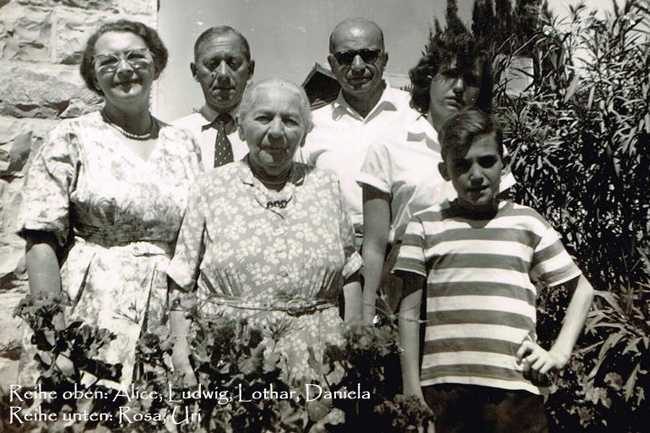
My grandfather struggled to build up a new shoe business again and handed over his business to his eldest son in the 70ties. My grandfather died in 1981, my grandmother in 1982. The shoe shop had to be closed down soon after. In the meantime, 3 of the 6 Schatka children have already died, among them the eldest son who was the only one old enough to have a conscious memoir of the war and the flight.
I have contact to all three grandchildren of Ludwig and Rosa Eisner. They help me to complete the story.
